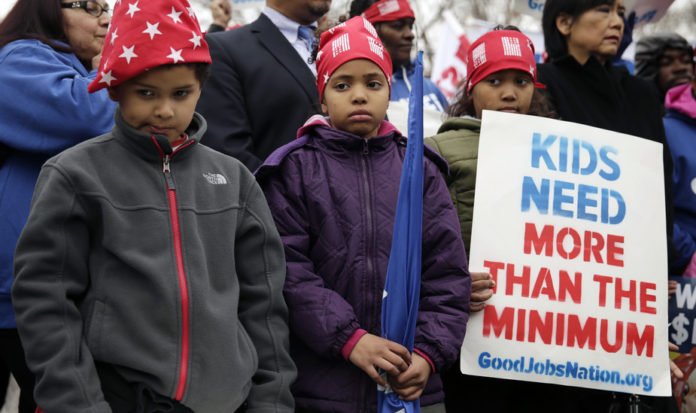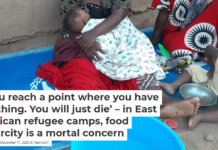
By Lisa Dodson, Brandeis University
Fifty years ago, Lyndon Johnson spoke of war on poverty and pursuit of a great society. He talked about investing in education and employment and about eliminating social exclusion that comes with poverty.
Above all, he pointed to opportunity for all as the backbone of a great society.
Since then, LBJ and the social programs that emerged during that time have been justifiably criticized. Nonetheless, that period of domestic policy gave rise to a conviction that fighting poverty was a national cause because the whole society is stunted and degraded when millions of people live poor.
Fifty years later, we don’t fight poverty anymore.
No safety nets today
We don’t even promise to keep low-income children cared for and safe. Forget safety nets; if parents can’t buy their way out of economic harm, their kids lose – a lot.
We have a surfeit of data that show how poverty undermines health, development, emotional well-being and our whole life course. For example, poor children are more likely to have chronic respiratory and stress-related problems, experience obesity and to leave school before graduating, all affecting life opportunities.
We know that today almost half of US children – some thirty million – live in or near poverty.
Working hard, caring for each other, trying to juggle two or three jobs with schooling and bills that outstrip wages, people living these conditions are a big part of the nation. But they slipped off the policy map years ago along with the national conviction that the welfare of our people is worth a fight.
Over the last decade I have heard a lot about what happens when a nation backs down.
Living in poverty: the mother’s experience
In doing research on wages and family life, I have listened to hundreds of parents – mostly mothers – describe relentless waves of crises in housing, childcare, transportation and the loss of public aid. They report a morass of obstacles to receive even the tiniest public help. They talk about a quagmire of low-wage, go-nowhere jobs that have irregular schedules, unpredictable hours and few or no benefits.
As one young mother explained recently, “There’s no one that cares but you, so you do what’s best for your child and forget them….” Another said that if your children are “…minority…or just poor,” no one seems to notice what is happening – “they just don’t see,” she said.
A grandmother asked me the question, “How would you feel if you couldn’t keep your children warm?” She went right to the heart of matter; how is it that we simply accept the damage and suffering that poverty is doing to so many?
A centuries-old commitment to public responsibility
Back in colonial times, poverty was common cause; everyone had to pony up whether they liked it or not.
If you were well heeled in a colonial-era town, you would be expected to house a struggling family or apprentice a youngster to your trade and pay a tithe for the common good.
While adults were expected to work hard and overcome hardship, the whole society was responsible for creating the opportunity to make that possible.
This principle – individual effort coupled with societal responsibility – remained a tense partnership for centuries, tipping back and forth.
Social programs such as mothers’ aid programs, social security for the elderly and disabled, child health services, unemployed workers’ jobs corps, and general “relief” for poor families were programs that would rise and fall back.
In the 1960s, LBJ described the war on poverty as society’s commitment to “…millions of Americans – one fifth of our people – who have not shared in the abundance which has been granted to most of us, and on whom the gates of opportunity have been closed.”
While the great society programs that emerged may have been deeply flawed, that did not negate the nation’s responsibility for alleviating poverty. Yet in the 1990s, domestic policy went into a full retreat, dramatically cutting support for poor families.
Change in the 1990s
Arguably, the greatest achievement of the 1996 welfare reform was the consolidation of bipartisan support for making sure jobs – any job, at any wage – became the sole option for poor families.
Messaged as a mix of personal responsibility and work opportunity, what was omitted was wage responsibility.
The low-wage labor market gained access to hungry workers who had no option but minimum wage, no-future work disproportionately affecting African American and Latino families.
The meanest betrayal of all was a collective shrug at the impact on children. Safety nets gone, parents were tied to jobs but were unable to cover rent and heat, far be it buy childcare.
What happened – what is happening – to all those kids when parents work multiple jobs, shifts, unpredictable schedules, and still can’t pay the bills? Actually, there’s not a lot of effort to find out anymore. But we do know half of US children live poor and that black and Latino children are disproportionately affected.
We know reams about the effects of economic instability on children and family well-being and it is not good news.
Wage responsibility: the elephant in the room
How would we renew a commitment to poverty alleviation in the US?
This nation has every possible resource to face the challenge. Foremost, we have a remarkably hard-working population committed to being responsible and independent. We also have a centuries-old commitment to public responsibility and investing in human development and providing aid for those who are young, elderly, disabled or otherwise need some assistance.
But the elephant in the room, when it comes to responsibility for causing as well as reducing poverty, is wage responsibility, decent jobs responsibility and business responsibility for ensuring that working people can take care of their families.
This has been a decade of unsurpassed wealth gain for the richest few. Now we are beginning to see evidence of a renewed antipoverty spirit at least on the local, city and state levels. Raising the minimum wage is a growing focus all across the country with ballot initiatives on the issue passed in five states in the November elections, including in so-called red states.
At the community level nationwide, there are organizations working to improve child care and other safety net programs for low-wage families.
Working people are joining up with progressive legislators, mayors and business leaders to take responsibility for building a better society.
This article is part of a series commemorating Lyndon B Johnson’s Great Society programs
![]()
This article was originally published on The Conversation.
Read the original article.




















